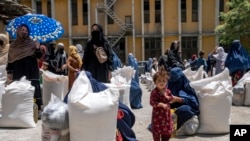The humanitarian situation in Afghanistan has shown preliminary signs of improvement, with the United Nations reporting a significant reduction in the number of people in need of assistance.
Afghanistan's economic collapse in 2021, triggered by the government's disintegration, the Taliban takeover, and the subsequent withdrawal of foreign aid, left the landlocked country in crisis.
For two years, aid agencies have warned of mass starvation and famine.
Last year, the U.N. reported that more than 29 million Afghans desperately needed assistance. Despite Afghanistan’s population growing to an estimated 44.5 million, the number of those in need of assistance has since declined to 23.7 million this year.
“In Afghanistan, a fragile progress has tenuously stabilized conditions, reducing immediate needs,” the U.N. Global Humanitarian Overview 2024 states.
The reported decrease in humanitarian needs has led to a significant reduction in the U.N.-led Afghanistan appeal, from $4.6 billion in 2023 to $3.07 billion this year.
Aid agencies, however, warn that the situation remains fragile.
“Although the numbers have improved, the situation is still terrible,” said Becky Roby, advocacy manager with the Norwegian Refugee Council.
The economic stabilization is at an “unacceptably low level and most households remain extremely vulnerable to shocks,” Roby told VOA.
Causes and credit
The U.N. and aid workers attribute the improvements to massive humanitarian operations over the past two years, which have provided food and protection to millions across Afghanistan.
Despite a staggering 53% funding gap in the 2023 humanitarian appeal, the increased contributions from donors like the United States, the Asian Development Bank and the European Union have played a crucial role in mitigating the crisis.
“On a micro level, we’ve seen instances where Afghans step in to help one another, for instance, after natural disasters,” said Ali Latifi, Asia editor at The New Humanitarian, a nonprofit humanitarian news agency.
General licenses from the U.S. Treasury, offering specific waivers for financial transactions to circumvent sanctions, have played a crucial role in enabling the flow of remittances to Afghanistan.
These funds provide a lifeline for many households with relatives abroad.
Meanwhile, de facto Taliban officials say their economic policies and efforts to tackle corruption have contributed to stabilizing inflation, market disruption and the private sector.
Aid agencies, however, emphasize that ongoing Taliban restrictions, particularly the ban on women's work, continue to significantly impede and weaken humanitarian activities.
No time to cut aid
More than half of Afghanistan’s population, 23.7 million, are considered in need of humanitarian assistance, but aid agencies will not be able to assist all of them.
The U.N.-led humanitarian appeal for Afghanistan this year seeks $3 billion to assist 17.3 million people.
As of March 25, the appeal has only received 7% of the required funding.
“Without the right funding, implementers will not be able to deliver adequate humanitarian assistance, and ultimately this means that people's basic needs will go unmet,” the NRC’s Roby said.
Foreign assistance has been crucial in the limited economic stabilization Afghanistan has achieved since 2022.
However, when confronted with concerns that the Taliban’s misogynistic policies could jeopardize this aid, Taliban chief spokesperson Zabihullah Mujahid retorted in an online forum last month, “We don't need their assistance. Spare us from their [foreigners’] harms.”





